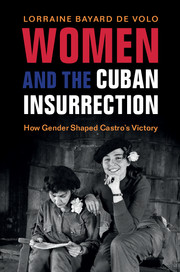Book contents
- Women and the Cuban Insurrection
- Women and the Cuban Insurrection
- Copyright page
- Dedication
- Contents
- Preface
- 1 Revolution Retold
- 2 “How Can Men Tire When Women Are Tireless?”
- 3 A Movement Is Born
- 4 Abeyance and Resurgence
- 5 Gendered Rebels
- 6 War Stories Celebrated and Silenced
- 7 “Stop the Murders of Our Children”
- 8 Masculinity and the Guerrilla War of Ideas
- 9 Women Noncombatants
- 10 Las Marianas
- 11 Past Is Prologue
- Bibliography
- Index
3 - A Movement Is Born: Military Defeat and Political Victory at Moncada
Published online by Cambridge University Press: 19 January 2018
- Women and the Cuban Insurrection
- Women and the Cuban Insurrection
- Copyright page
- Dedication
- Contents
- Preface
- 1 Revolution Retold
- 2 “How Can Men Tire When Women Are Tireless?”
- 3 A Movement Is Born
- 4 Abeyance and Resurgence
- 5 Gendered Rebels
- 6 War Stories Celebrated and Silenced
- 7 “Stop the Murders of Our Children”
- 8 Masculinity and the Guerrilla War of Ideas
- 9 Women Noncombatants
- 10 Las Marianas
- 11 Past Is Prologue
- Bibliography
- Index
Summary
On July 26, 1953, Fidel Castro and Abel Santamaría led 120 rebels in an assault on the Moncada garrison in Santiago de Cuba, the country's second largest city. As a diversion, forty more rebels attacked the Bayamo military garrison 70 miles away. The plan was to quickly take over Moncada, capture weapons, and broadcast news of the victory to rally the public. What followed instead was a disaster in which nearly 40 percent of the insurgents died and many others were captured. The scholarly literature on Moncada tends to focus on the rebel military strategy and shortcomings while noting the symbolic importance of Moncada. The Cuban War Story – the dominant revolutionary state narrative – frames Moncada as a military defeat turned political victory. But thus far little analysis has been done to analyze how this symbolic power operated at the time so as to produce a political victory. Taking a gender lens to this important episode, including the assault, courtroom trials, and post-assault support, I explore women's participation, the gendered division of rebel labor, and the struggle for hearts and minds in order to better understand how this crushing defeat became a rebel rallying-cry.
I first examine Moncada through a more comprehensive exploration of women's contributions and experiences than the literature has provided thus far. I then turn to the puzzle of how a potentially humiliating military defeat became a rebel victory, pointing to Castro's skillful use of gender as a discursive tool to reorder hierarchies, differentiate between good and bad, and evoke sympathy. Rebel courage, along with their underdog status and the military's brutality, caught the nation's attention, but Fidel still had to mold this attention into public support, and he did so through a language of masculine heroic martyrdom and feminine vulnerability. In court, he effectively claimed popular support, mitigated the humiliation of military defeat, and framed the rebels as superior men. Indeed, a prominent effort within Castro's courtroom defense involved contrasting honorable rebel masculinity with the debased, assaultive masculinity of the regime – a successful discursive strategy that rebels continued to pursue throughout the insurrection. He further used women's testimonies to both enhance the emotionally evocative narrative and shield rebel men's masculinity from the feminizing attributes of victimization.
- Type
- Chapter
- Information
- Women and the Cuban InsurrectionHow Gender Shaped Castro's Victory, pp. 46 - 64Publisher: Cambridge University PressPrint publication year: 2018



